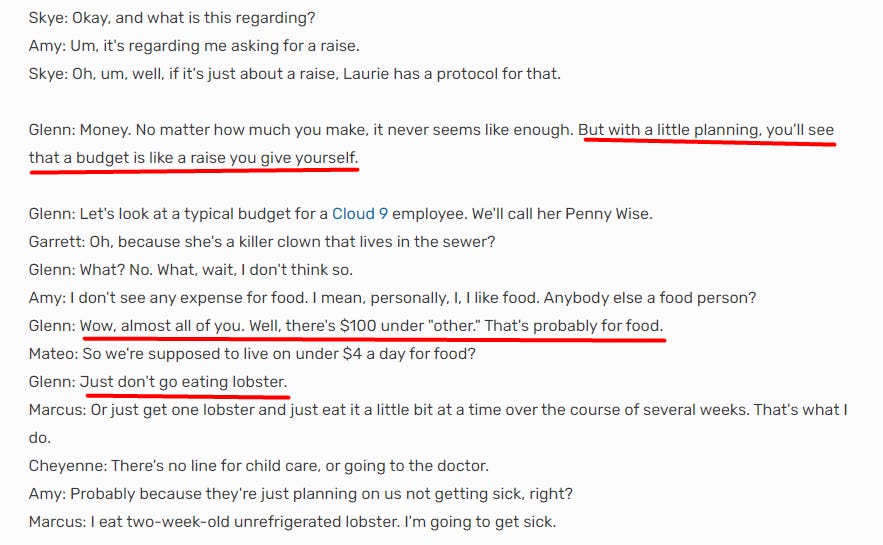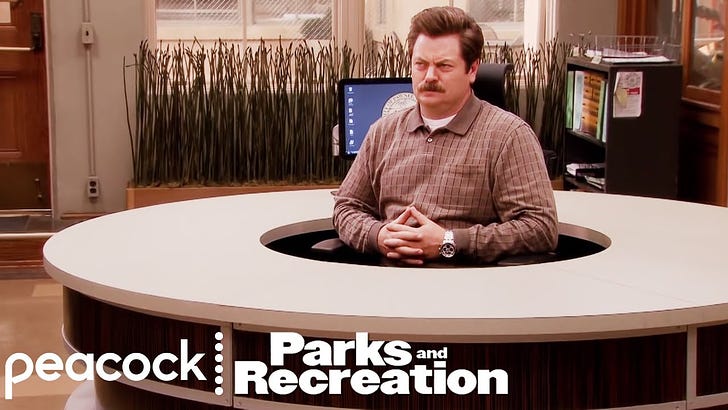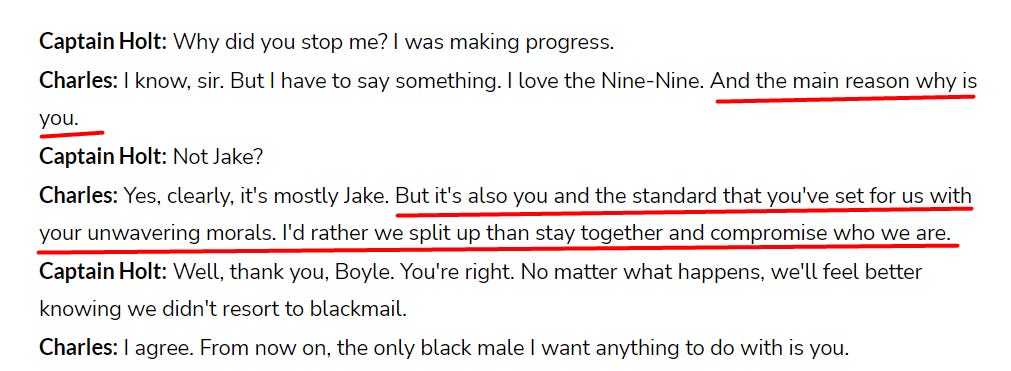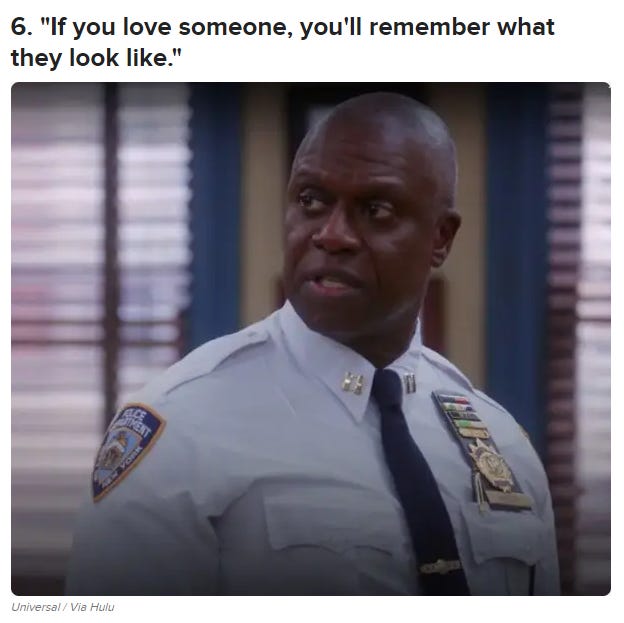The Best Management Training is available to Stream
You may already have subscriptions to the best leadership courses.
Management, I’ve heard it said, is mostly about pointing and shouting.
For a community-based species, like humans, leadership is essential. The debate rages on whether leaders are born or made. Irrespective, people determined to lead, even just as their day job, seek knowledge on the subject.
Being a fundamental element of culture, any sort of depiction of the human experience includes the practice of leadership; even TV shows.
What follows are four examples of excellent leadership caught on TV.
Parks and Recreation
Ron Swanson
Naive viewers would regard Ron as a grump or misanthrope, even consider him apathetic. Yet Ronald Ulysses Swanson is a rare example of positive masculinity. Whether such a concept existed before Parks and Rec, there are doubts.
Ron is principled, compassionate and straightforward. His character arc goes from memeable grouch to reluctant leader, to loving friend and father. Ron does not impose his rigid personal code of conduct on anyone, preferring to let others operate on their own merits. Parks and Rec feature numerous examples (1, 2, 3) of Ron’s wisdom and perception.
In the clip above, notice how Ron informs his manager, Chris, that his changes to the workplace fail to account for the personalities of the staff reducing overall productivity.
This exchange also introduces the next example.
Chris Traeger
Chris is easily the most enthusiastic character ever depicted on screen. The backstory for his mindset is quite interesting. Chris channels his positivity and privilege toward public works. His general approach is to imbue everything around him with his own energy. He firmly believes in motivation and leading ahead. However, when others cannot match his (impossible level of) energy, Chris adapts to their disposition. Where he must wield authority, he does so, with confidence. Where he must compromise, he does so, with grace.
Chris believes that to serve in government, one must operate with nothing less than the highest standards of integrity. While the rest of the characters often embrace sarcasm and such, Chris does not let this interfere with his own attitude. He is secure and capable of remaining supportive from a safe distance.
Notice Chris’ effective management of April in the next clip; he is both insightful and self-aware, simultaneously direct and supportive.
The dynamic between Ron and Chris is also an excellent demonstration of mutual respect.
Brooklyn Nine-Nine
Captain Raymond Jacob Holt
Captain Holt is a gay, black cop. Yet, in no time, he transitions out of that intersection of stereotypes, beyond a mere plot device. Much like Ron, he operates on a strict personal code of conduct. Over eight seasons, we see Raymond evolve past his standoffish nature, over-rational approach and non-personal demeanour to enjoy the tremendous mutual benefits of a close relationship with his squad. He embraces differences.
His team respect him; first for his principles, second for his vision; and third for his example. Captain Holt epitomizes leadership by example.
He is quick to apologize and recognize his own flaws, shortcomings and misunderstandings. Lastly, he continuously challenges (1, 2) his colleagues in demanding yet healthy ways. At the end of the show, both Captain Holt and all his colleagues are better people.
Any show with Cesar Millan
Cesar has a few TV shows, a Youtube channel and an Instagram account.
Cesar Millan’s latest series is called Better Human Better Dog. But what does The dog whisperer have to do with leadership? Well, his philosophy is unique; his results, impressive.
Cesar reckons he does not train dogs; he trains humans. Since dogs operate on an energy spectrum, it is the expectation of a dog owner to manage their pet’s energy via managing their own energy. If you show fear, your pet will be afraid; if you stand firm, your dog will stand with you.
Cesar’s approach is centred on respecting dogs for being dogs while interacting with them on terms they understand. His advice for “pack leaders” is to be calm, confident and assertive; to lead with a simple, direct, pack-serving mentality, constantly aware that productivity can only happen where there is trust, respect and love.
Ultimately, Cesar himself believes that better dogs equal better humans. By enabling humans to better interact with animals, you are indirectly creating better people: people capable of assisting others, especially those that depend on them for leadership, to operate with a sense of purpose.
The beauty of Cesar’s Way is how it challenges conventional thinking.
“[A]nimals don’t follow unstable pack leaders; only humans promote, follow, and praise instability. Only humans have leaders who can lie and get away with it. Around the world, most of the pack leaders we follow today are not stable. Their followers may not know it, but Mother Nature is far too honest to be fooled by angry, frustrated, jealous, competitive, stubborn, or other negative energy—even if it is masked by a politician’s smile.” - Cesar Millan, Be the Pack Leader
The last trait worth mentioning is Cesar’s intolerance of anything but success. (You just have to be wise and cautious about what defines success.)
Bad Bosses
There are plenty of poor leaders on regular TV shows as well. Here are just two examples.
Michael Scott
A prominent example is Michael Scott from The Office. Michael is self-involved, self-aggrandizing, ignorant and incompetent; shallow, vain, a burden to upward manage and untethered to reality - the list can go on. He blames his staff for his mistakes. He cheats people out of recognition. He does not listen. Michael Scott is entertaining to watch, horrifying to imagine existing in reality.
Vikram: I was a surgeon back home.
Michael Scott: Really?
Vikram: Yeah.
Michael Scott: Wonder what I would've been back home.
Vikram: Well, this is your home.
Michael Scott: I know, but I mean, it's so competitive here. What's the dollar worth in your land? Medical school must've cost, like, 40 bucks or a donkey or something.
Vikram: Uh, no.
Michael Scott: I would've been chief of surgery. Or a cowboy.— The Office, S04E04
Glenn Sturgis
Eventually, we discover that Glenn himself is a victim of Cloud Nine, the corporation behind the store in Superstore. Glenn is naive, myopic, stubborn and far too eager to please. He also believes that the business can do no wrong, oftentimes leading to situations that hurt his staff. Glenn is not the worst leadership example on TV but he does highlight the danger of a bad manager hiding behind the veneer of a harmless goof.

Lead us not into temptation
I won’t conclude by telling you what a good manager/leader is; I’m not qualified to. Though, here is my personal definition of a good leader, most of which is based on everything above: a great leader, leads by example, armed with vision and empathy, projecting a calm, confident, assertive energy that motivates and inspires those they lead.
Thanks for reading. Hey, at the very least, you found some fantastic TV shows to watch.




